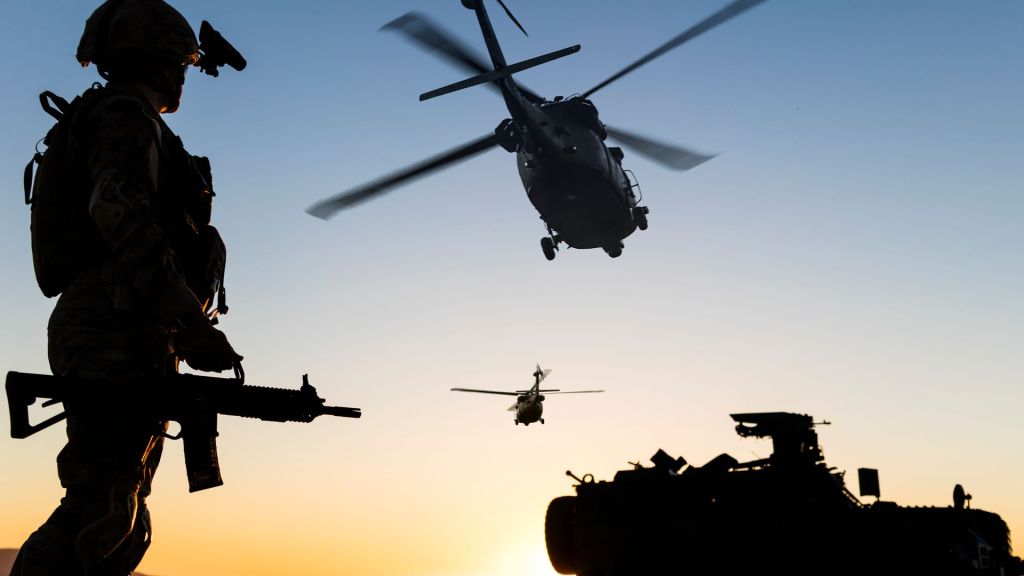
Commentary
-
Our commentary partners will help you reach your own conclusions on complex topics.
A year ago, the world watched, stunned, during the disastrous withdrawal of US troops from Afghanistan. The initiative, which started with the Trump Administration’s poorly thought-out Doha Agreement and knee-capped by Trump’s hollowing-out of the State Department, but was also unquestionably handled with profound incompetence by the Biden Administration, was a horror show from start to finish. With images of babies being hauled over walls at the Kabul Airport and desperate people falling to their deaths from airborne planes seared into our collective memory.
A year later, in part due to the understandable exhaustion that comes with a daily litany of Defcon-1 level hysteria courtesy of the news cycle, the “story” – which, let’s remember, is a matter of daily life for the Afghan people – is only intermittently headline news. So because a limited attention span when it comes to suffering isn’t a courtesy afforded to our fellow human beings, let’s look at where Afghanistan is now.
When the Taliban took over, more rapidly than I think anyone had anticipated, advances in human rights – specifically women’s rights – and media freedom were rolled back almost immediately. Millions of Afghans face severe and life-threatening food insecurity due to a loss of income paired with skyrocketing costs. A U.N. report of the 10 months following the withdrawal documented extrajudicial assassinations, torture, and dramatic cutbacks in free press, peaceful protest, and women’s and girls’ access to everything from education to mobility.
Is what’s happening to the Afghan people the responsibility of the United States government? In large part…yes. For two decades, administrations across aisles worked to create a tremendously aid-dependent Afghan state without seriously investing in a political infrastructure that would ensure ongoing peace.
And now we’re seeing the fallout of this failure. And to those who want to focus on the problems in America – America first – I do hear you. We are all battered, exhausted, we are just racked by fears of everything from economic insecurity to ever-escalating gun violence, and it’s easy to say, “Hey, what is happening over there is not my problem.”
All this is exacerbated by the fact that uncertainty exists with regards to how humanitarian funds will be allocated in the Taliban-ruled country, thereby disincentivizing US donors to provide aid. Is engaging with the regime legitimizing it, or even directly funding it?
It’s a fair question. And the answer to, “will some of the proffered aid fall into Taliban hands” is, unfortunately, yes. But the prevention of an even greater humanitarian catastrophe than the one that the Afghani people are facing now requires that we accept that efforts will inevitably involve some degree of liaising with the Taliban, as well as a reasonable degree of certainty that yes, some humanitarian aid – but, crucially, not all – will end up in Taliban control.
Is that a hard pill to swallow? Of course it is. And the July airstrike targeting al-Qaeda leader only underscores the ongoing terrorist threat posed to the United States. It makes sense to approach the issue of aid allocation with caution, and if you check out the links below this video, you’ll find a list of excellent organizations that are working with leaders inside the country to deliver aid to the people who desperately need it.
Importantly, though, “caution” doesn’t preclude action, and the moral and reputational consequences of abandoning those who have been endangered as a direct consequence of their support for the United States – as well as human beings suffering near-famine consequences through no fault of their own – are severe, and would only serve to further destabilize our standing in the international community.
It’s not a question of America first, or America second. It’s an intersectional issue – one that cannot, and must not, be sidelined.
-
RFK Jr.’s war on psychiatric meds risks decades of progress
On Feb. 18, during his first meeting with staff, Health and Human Services Secretary Robert F. Kennedy Jr. stated that he intends to address the possible overmedication of children and the risks of antidepressants — echoing a Trump executive order aimed at reducing childhood chronic disease rates. The order has sparked concerns over youth access… -
Loss of USAID makes America and the world less safe
Elon Musk and President Trump shocked the U.S. foreign policy community and America’s partners around the world with the early and abrupt closure of USAID, the United States Agency for International Development. USAID was a cornerstone of U.S. foreign policy and consistently received bipartisan support from Congress. Experts warned that the decision puts millions of… -
Trump’s ‘Gulf of America’ renaming is mere political spectacle
Aboard Air Force One, en route to the Super Bowl in New Orleans, President Trump held a news conference. As the flight entered international waters over the Gulf of Mexico, he issued an executive order renaming it the “Gulf of America” and declaring Feb. 9 as “Gulf of America Day.” The order, titled Restoring Names… -
President Trump politicizes DC plane crash as Americans mourn
Sixty-seven people died when a Black Hawk helicopter crashed into American Airlines Flight 5342 as it came in for a landing at Reagan National Airport on the night of Jan. 29 outside of Washington, D.C. Investigators are still examining the accident and putting details together, but believe that the helicopter was flying at too high… -
Project 2025 is Trumpism on steroids
President Trump has already taken several actions that align with Project 2025, a far-right blueprint for Trump’s second term developed by the Heritage Foundation. Among other intiatives, his administration has moved to eliminate DEI programs, reinstate service members dismissed for refusing the COVID-19 vaccine, and revive “Schedule F,” a policy making it easier to fire…
Latest Opinions
-
 Getty Images
Getty Images
NFL scouting combine: How much faster can these players run?
-
 Getty Images
Getty Images
James Cameron seeks New Zealand citizenship following ‘horrific’ Trump re-election
-
 Getty Images
Getty Images
San Francisco DA Charges 11 in SNAP fraud scheme involving $4M
-
 Getty Images
Getty Images
California’s minimum wage increase led to job losses, higher prices: Study
-
 Getty Images
Getty Images
Appeals court blocks Arizona’s proof of citizenship law, cites voter suppression
Popular Opinions
-
In addition to the facts, we believe it’s vital to hear perspectives from all sides of the political spectrum.






